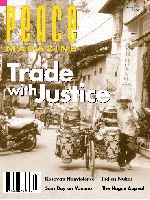
Peace Magazine Jan-Feb 1998, page 15. Some rights reserved.
Search for other articles by Hanna Newcombe here
Project Ploughshares and Science for Peace sponsored a discussion of economic sanctions at the University of Toronto November 27-28, 1997
Economic sanctions have become an important instrument for expressing disapproval of certain proscribed acts of nations, such as cross-border aggression and gross violations of human rights. Sanctions are perceived as milder than going to war, but more stringent than mere diplomatic protest or the withdrawal of ambassadors. Yet sanctions can inflict great suffering on innocent civilians, especially children and women, while leaving guilty leaders relatively unharmed. At least two conference speakers (Nossel and McCutcheon) labeled economic sanctions as acts of war, because they amount to a blockade. Nevertheless, sanctions do have value as symbolic acts of disapproval. The discussion tried to find actions which would either make sanctions more humane, or would substitute alternatives to serve the functions now fulfilled by sanctions.
On Friday evening at Innis College, Ed Broadbent stressed that human rights of workers need to be protected throughout the world through social clauses which should be embedded in all trade agreements. Some discussants after the talk expressed opposition to most trade agreements in the first place, but Broadbent insisted that the agreements were acceptable only if they included both a social clause and environmental protection mechanisms. [See Tim Donais' report of Broadbent's speech, this issue.]
The first speaker on Saturday morning at Hart House was Kim Nossal of McMaster University. Although sanctions finally forced the regime to put an end to apartheid in South Africa, there are basic ethical objections to the use of sanctions in general cases. Sanctions are a form of punishment and there are four preconditions that would make punishment morally acceptable: 1) there must be a legitimate authority to administer harm; 2) the guilty rather than the innocent should be punished; 3) individuals rather than collectivities should be punished; and 4) all offenders must be treated equally. Sanctions as presently practiced do not fulfill any of these preconditions. Therefore sanctions must be considered acts of war.
Douglas Forsythe of the Canadian Department of Foreign Affairs claimed that, as a member of the United Nations, Canada must observe U.N.-mandated sanctions. However, Canada does not have to (and in fact does not) observe sanctions imposed by a single state, such as the United States. This principle concerns the sanctions against Cuba, North Korea, and Vietnam.
In the afternoon there were three discussion groups examining the cases of sanctions against South Africa, Iraq, and Cuba -- three very different cases. Moira Hutchinson, reporting for the South Africa group, emphasized that while it is difficult to generalize about sanctions, in all cases we should ask: Are we hurting those we are trying to help? In the South Africa case, sanctions were validated by the fact that the local people (not only the ANC government-in-exile) asked for them. The people of Iraq and of Cuba never requested sanctions and would oppose them if they had the opportunity to say so.
Jasmin Habib reported on the Iraq group, which was led by Rick McCutcheon. He had provided the group with a historical background on Iraq and Kuwait, and explained why the prolonged sanctions, which both preceded and followed the Gulf war of 1991, and were killing hundreds of thousands of Iraqi children through malnutrition and preventable diseases, made this really a "new kind of war" which should not be tolerated. Even the "food for oil" deal hardly helped.
Gary Warner reported on the sanctions against Cuba imposed by the U.S. for more than thirty years. The goals had shifted -- first to oppose the nationalization of U.S. corporations, then against communism as part of the Cold War, and now against violations of human rights. Yet, while civil and political rights are violated in Cuba, that country actually has a good record in upholding social and economic rights -- for example, its excellent health plan. Basically, these sanctions are driven by U.S. domestic pressures. If the issue were only human rights, why would the U.S. not have sanctions against Burma, Indonesia, or Turkey, to mention a few?
Among alternatives to sanctions, some were found in Margaret Doxey's article, which was included in the background papers for the conference. She was not a formal speaker, but participated actively in the discussion. She pinpointed so-called "targeted sanctions," which would be directed against the leadership, not the people. They include the following: prohibiting personal foreign travel by senior officials, both civilian and military; banning the target country's participation in international organizations; freezing foreign assets; cultural and sports boycotts; and restrictions on air links.
I also mentioned the alternative of bringing guilty leaders before an International Criminal Court when it is formed, but this suggestion was considered unrealistic by some other discussants.
Hanna Newcombe is a peace researcher living in Dundas, Ontario.

Peace Magazine Jan-Feb 1998, page 15. Some rights reserved.
Search for other articles by Hanna Newcombe here